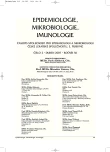-
Medical journals
- Career
Monitoring Genes Encoding Panton-Valentine Leukocidin in Staphylococcus Aureus Strains
Authors: I. Machová; P. Petráš; E. Blažková; L. Kňapová
Authors‘ workplace: Státní zdravotní ústav, Centrum epidemiologie a mikrobiologie, Národní referenční laboratoř pro stafylokoky, Praha
Published in: Epidemiol. Mikrobiol. Imunol. 56, 2007, č. 2, s. 88-93
Overview
Study objectives:
To detect the genes encoding an important virulence factor, Panton-Valentine leukocidin, in S. aureus isolates from clinical specimens.Material and Methods:
S. aureus strains from clinical specimens, mainly from patients with skin diseases, referred by microbiological laboratories of the Czech Republic. The strains were identified by both conventional phenotyping methods and molecular biological procedures, in particular polymerase chain reaction.Results:
Altogether 108 (8.1 %) of 1336 S. aureus strains had the genes encoding Panton-Valentine leukocidin in DNA. Only 11 of these strains were MRSA.Conclusions:
S. aureus strains producing Panton-Valentine leukocidin play an important role in serious infections, particularly of the skin. NRL for Staphylococci, National Institute of Public Health, Centre of Epidemiology and Microbiology, is able to detect the production of this toxin, under optimal conditions, within two days.Key words:
Staphylococcus aureus – Panton-Valentine leukocidin – CA-MRSA.
Labels
Hygiene and epidemiology Medical virology Clinical microbiology
Article was published inEpidemiology, Microbiology, Immunology

2007 Issue 2-
All articles in this issue
- Pertussis: a Reemerging Infection?
- Clinical Specimens for PCR Detection of Syphilis
- Urinary Tract Infections in Children Caused by Uropathogenic Strains of Escherichia coli and the Role Of The Innate Immune Response Mediated by the Toll-like Receptor 4 and Antimicrobial Peptide Cathelicidin in their Clinical Course
- Effectiveness of Aerial Application of VectoBac G Larvicide Granules Against Mosquitoes in the Olomouc Region in Spring 2006
- Monitoring Genes Encoding Panton-Valentine Leukocidin in Staphylococcus Aureus Strains
- Epidemiology, Microbiology, Immunology
- Journal archive
- Current issue
- Online only
- About the journal
Most read in this issue- Monitoring Genes Encoding Panton-Valentine Leukocidin in Staphylococcus Aureus Strains
- Pertussis: a Reemerging Infection?
- Effectiveness of Aerial Application of VectoBac G Larvicide Granules Against Mosquitoes in the Olomouc Region in Spring 2006
- Clinical Specimens for PCR Detection of Syphilis
Login#ADS_BOTTOM_SCRIPTS#Forgotten passwordEnter the email address that you registered with. We will send you instructions on how to set a new password.
- Career

